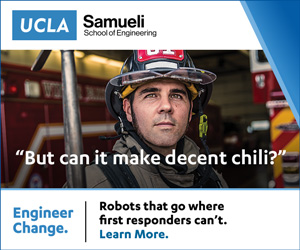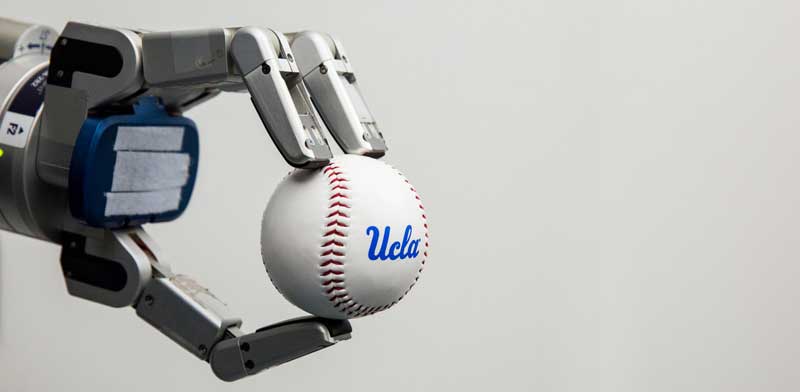Engineer Change.
Robotics and Cyberphysical Systems
 Firefighters are as close to superheroes as we’re likely to see on Earth. But there are some things even they can’t do. That’s why we’re working on autonomous systems that can be used by firefighters and first responders to access areas, and save lives, where humans otherwise wouldn’t be able to. It’s just one example of our world-leading work in robotics and cyberphysical systems.
Firefighters are as close to superheroes as we’re likely to see on Earth. But there are some things even they can’t do. That’s why we’re working on autonomous systems that can be used by firefighters and first responders to access areas, and save lives, where humans otherwise wouldn’t be able to. It’s just one example of our world-leading work in robotics and cyberphysical systems.
Bringing minimally-invasive, high-precision automated surgical techniques to doctors, enabling military field personnel to safely dispose of explosives, assisting stroke victims in recovering motion, enabling swarms of drones to self-organize on the battlefield – researchers at UCLA are using humanoid and non-humanoid mechatronics technology to make life better for the humans on the planet.
All that, and a team that’s developing soccer robots that compete (and win) in World Cup-style competitions. Their goal: to be able to beat the actual World Cup Champions in soccer… by 2050.
Want to see the future through the eyes of a robot? Check out what’s going on at the UCLA Samueli School of Engineering.

Click on the links below to visit some of our labs.
Exploring bionic possibilities at the intersection of innovative surgery and advanced robotics.
Director: Tyler Clites, assistant professor of mechanical and aerospace engineering
Working on projects on cooperative motion and swarming, including the mathematical properties of collective groups and the large scale dynamics that ensues from small scale motion.
Principal Investigator: Andrea Bertozzi,Professor of Mathematics, Betsy Wood Knapp Chair for Innovation and Creativity and Director of Applied Mathematics
Dedicated to improving quality of life by enhancing the functionality of artificial hands and their control in human-machine systems.
Director: Veronica Santos, associate professor of mechanical and aerospace engineering
Developing develop science, technology, and human resources at the interface between robotics, biological systems, and medicine.
Director: Jacob Rosen, professor of mechanical and aerospace engineering
Pursue a unified framework for representation, learning, inference and reasoning, and to build intelligent computer systems for real world applications. Projects span four directions: Vision, cognition, learning and autonomy.
Director: Song-Chun Zhu, professor of computer science and statistics.
Conducts research in computer graphics, computer vision, medical image analysis, computer-aided design and artificial life.
Director: Demetri Terzopoulos, Chancellor’s Professor of Computer Science
Research in neuronal control mechanism of animal locomotion, nonlinear oscillators, global pattern formation through local interactions, and robust/nonlinear control theory and its applications.
Director: Tetsuya Iwasaki, professor of mechanical and aerospace engineering
Research in modeling, analysis, control, and security of real-time, embedded, networked and distributed cyber-physical systems.
Director: Paulo Tabuada, Vijay K. Dhir Chair in Engineering, professor of electrical and computer engineering
Information theory and its applications to wireless and sensor networks; network data compression and storage; network secrecy; machine learning and large scale data analysis algorithms.
Director: Suhas Diggavi, professor of electrical and computer engineering
Focuses on servo control with applications in precision machining, engine control and nanopositioning.
Director: Tsu-Chin Tsao, professor of mechanical and aerospace engineering
Research in embedded and cyber-physical systems for applications in Internet of Things (IoT), ubiquitous and mobile computing, and pervasive sensing and control.
Director: Mani Srivastava, professor of electrical and computer engineering, computer science
Developing on-demand design and fabrication of custom programmable machines. Research interests include cyber-physical systems, on-demand design, rapid fabrication, and autonomous control
Director: Ankur Mehta, assistant professor of electrical engineering
Humanoid robots and novel mobile robot locomotion strategies. Research interests are in the area of robot locomotion and manipulation, soft actuators, platform design, kinematics and mechanisms, and autonomous systems.
Director: Dennis Hong, professor of mechanical and aerospace engineering
Working to better understand and quantify the condition and remaining useful life of civil and mechanical infrastructure systems through the intelligent use of sensors and data. Pioneering sensing systems that can measure the state of infrastructure nondestructively above and below ground as well as in aquatic environments.
Developing experimental and computational tools that can be used in conjunction with data-driven machine learning methods to design, model and build smart programmable structures. Working to gain a more thorough understanding of the mechanics of a variety of engineering and natural systems, such as deployable structures in engineering and bacterial locomotion in nature.
Investigating how images can be used to infer properties of the physical world such as shape, motion, location and material properties of objects within. Such understanding is key to developing engineering systems that can “see” and interact intelligently with the world around them.
Director: Stefano Soatto, professor of computer science
